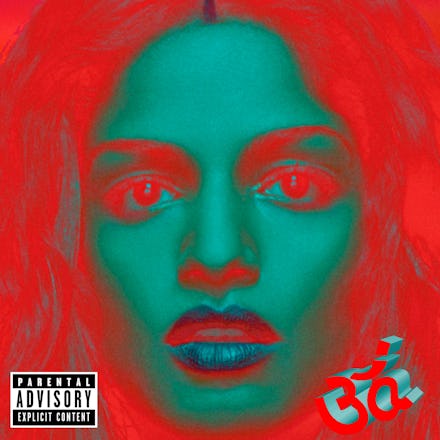M.I.A. 'Matangi' Album Review: Bad Girls Still Do It Well

"If you're gonna be me you need a manifesto," M.I.A. sings on the title track to her finally-released new album, Matangi. You get the feeling that she means the line sincerely. While the album is great, it shows Maya herself floundering without solid principles to fight for.
In the opening track, "Karmageddon," she inadvertently introduces the major flaw of Matangi. "My words are my armor and you're 'bout to meet your karma," she sings. Rather than going on the attack, M.I.A. sets herself up on the defensive. For the woman who burst onto the scene a decade ago by preaching social justice and awareness of global crises, throwing up a shield is not typically her aesthetic.
M.I.A.'s last album, Maya, was released in 2010, but her life has changed significantly since. She became a more widely-known cultural force, entered a vicious custody battle with her ex-fiancé, and was sued by the NFL for — ahem — upstaging Madonna at the Super Bowl. But also in 2010, an unforgettable profile in the New York Times revealed the duplicity to her image: while she spoke of staying true to her Sri Lankan roots and raising awareness of terrorism and threats to privacy, she was pampered in an upscale lifestyle.
This is not to say that we should criticize M.I.A. for becoming successful and taking advantage of her astounding rise and achievements — "we started from the bottom but Drake gets all the credit," she accurately sings on "Matangi" — but it does mean that her priorities have shifted since Arular.
Yet M.I.A. apparently doesn't want to admit that. Instead, on Matangi, she lazily tosses clichéd social justice themes into the songs without any real meaning. Even on "aTENTtion," a song written with help from WikiLeaks's Julian Assange, who "decrypted the whole of the internet" to find all of the words that have the sound "tent" in them, you can see her struggle to balance personal vindication with global issues. She focused on the word "tent" to speak to refugees living in tents in camps, but when she describes herself as a refugee, it's hard not to think of her life of excess.
Much of this album feels passive and responsive. Rather than creating original concepts as she once did, M.I.A. is busy defending herself and talking back at other artists. Specifically, she seems to have fallen into a Drake-obsessed rabbit hole. First, she mentions him on "Matangi." Then, she features The Weeknd, Drake's protégé, in "Exodus," where she speaks against general materialism — "you can have it all," she samples, "but tell me what for?" Finally, she directly strikes out at Drake with "Y.A.L.A.," where she refers to her heritage in the majorly Buddhist and Hindu Sri Lanka. In a clever twist on words, "Y.A.L.A." stands for "you always live again," but also is phonetically an Arabic phrase meaning "come on, let's go."
"If you only live once why do we keep doing the same shit?" M.I.A. asks at the end of "Y.A.L.A." Throughout the album she is stuck in an adamant personal defense: I'm still the same, and I'm better than any of you will ever be. When she steps away from her tired social justice themes, she's at her lyrical strongest. It's an admirable stance. She takes a cue from Kanye to fuel her own ego and celebrate her achievements as few women do. In "Only 1 U" she speaks in second person, but it's clear she's speaking to herself: I'm the only one who can do what I'm doing. And she's right to say so.
Earlier this year, M.I.A. explained that the album was delayed because her label said she was sounding "too positive." So perhaps we have them to blame for the phony righteousness. M.I.A. shines when she allows some positivity to come through, such as on the crazy fantastic club banger "Come Walk With Me" or the bright "Lights," which she produced alone.
On her old hit, "Bad Girls," it was clear she was having some fun celebrating herself rather than shouting back at haters, and that easily translated to her bold drive for social justice. Without directly referring to a cause besides her personal embodiment of sexual empowerment and feminism, "Bad Girls" is an effective and sincere call for equal rights. She demonstrated this in the music video, which speaks to the ban of women drivers in Saudi Arabia.
M.I.A.'s mix of sounds, with samples and styles taken from all over the world, is still uniquely her own, and it's still freaking awesome. There are alarmingly few Asian artists who have broken through in America's music industry, so it's good that she relies so heavily on South Asian sounds and references. She does it in such an exciting way, too, at times blending seamlessly with typical EDM sounds, such as on "Double Bubble Trouble." She's absolutely right that no one is coming close to what she's doing, I just wish she — or perhaps her label — could enjoy it more.